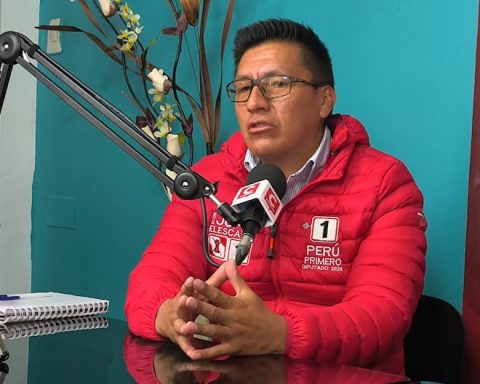The clock marked 7:02 p.m. when the President of the Republic released before the General Assembly his “firm commitment” to reduce in 2023 the ISocial Security Assistance Tax (IASS) and Personal Income Tax (IRPF) if the economy allows it.
Just two minutes later, in a WhatsApp group of several legislators from the different coalition parties that have been working on a gradual elimination of the IASS, the first messages began to drop. Luis Lacalle Pou faced the last section of his speech while on that platform some sent applause and celebrated the novelty, and others expressed their “disbelief” and the need for the changes to take place from this year.
The most important announcement of the seventy minutes of balance made by Lacalle Pou had a good reception in governmentalthough some leaders stress that it would have been opportune faster “signal” and they insist that the president only ratified an electoral promise that the coalition assumed during the campaign that brought it to the government.
One of the most critical voices was that of the Colorado deputy Gustavo Zubía, which last year was one of the promoters of a minute in the House of Representatives to consider the progressive elimination of the tax on higher pensions. The Third Way leader said he felt “partially happy” because although Lacalle Pou reiterated the commitment of the campaign, for the legislator “Nothing new was said.”
And in part, it is true. In the government program signed by the five parties that today make up the government, one of the chapters is dedicated to the “protection of the weakest” and the last point of the three pages of promises in that section establishes: “To the extent that the state of public finances allows, consider a gradual elimination of the IASS.” Words more, words less, what Lacalle Pou stated this Wednesday. In any case, although the Commitment to the country does not make specific references to personal income tax, the Cabildo Abierto and Colorado programs did propose to revise it.
This Thursday the president went further and said in an interview with Telemundo (Channel 12) that “hopefully” there will be a total elimination of the IASS by the end of the period and he remarked that “we must work hard” to exonerate the lowest income tax brackets.
In dialogue with The ObserverZubía explained that he “as well as the people” do not want promises but achievements from the government. In addition, the deputy said that at the end of last year he met with Azucena Arbeleche and the Minister of Economy and Finance told him that they could “make numbers” to approach a descent of the IASS. “The expense would be more or less around US$ 7 million per year: “In accounting terms it is a tip for the State”, argued the deputy regarding why he believes that “The answer has to be now.”
Along the same lines as Zubía, the deputy of Cabildo Open, Sebastián Cal, which also promoted the progressive elimination of the IASS last year in Deputies. Although the representative for Maldonado assured that he was “very happy” with the announcement of the President of the Republic before the parliamentarians, he considered that Zubía “is right” and He believed that “the ideal” would be for the reform to take place “now”.
Several leaders of the ruling party consider that it would be good convey a message of concrete compliance with the Commitment by the country even before the Uruguayans decide the fate of the 135 articles of the Urgent Consideration Law (LUC). The argument is that this would give “credibility” in the run-up to a March 27 where the ruling party assures that not only part of the star rule of the government will be at stake, but the entire administration.
According to the latest data published by the General Tax Directorate (DGI) on its website, around 460,000 workers pay personal income tax on their income, which is equivalent to 34% of the total universe of potential taxpayers, and last year’s collection for this tribute was about US$ 2,062 million. Meanwhile, the collection by IASS was about US$ 317 million. The non-taxable minimum is currently equal to $41,312. This tax is paid by around 24% of the country’s retirees, that is, some 173,000 taxpayers.
nuances
In the coalition there are coincidences that Lacalle Pou’s announcement is important. Although some recognize that a wink in tax matters for 2022 was convenient, they also recognize that the health emergency due to covid-19 played its part in the State accounts and insist on looking at the “glass half full”.
The deputy of the Colorado Party, Conrado Rodríguez, told The Observer that the tax measures planned by the president are “very important”, although he stated that “As far as the numbers give” it would be good if a signal were marked before the end of this year. “It would be desirable to raise the non-taxable minimum in the IASS and achieve greater deduction capacity in the IRPF so that it is a true tax on income and not on income,” said the leader.
And although he stressed that the Colorados have been working along these lines, he also stressed that the Uruguayan economy is still affected by the pandemic. That same argument was used by other leaders, such as the senator from Cabildo Abierto, Guillermo Domenech, who recalled that the country has gone through “difficult years” and emphasized that he is happy with the decision announced by Lacalle Pou.
The party led by Guido Manini Ríos has repeatedly stressed the need for a tax reform in the country and has been demanding greater interference in the government’s economic decisions, even with some formal proposals to Minister Arbeleche. In this framework, the reading of the president of Cabildo Abierto is that the president’s announcements put Uruguay on the path “to rationalize taxation”, something that according to Domenech cannot happen “from one day to the next”.
For lobbyist Álvaro Perrone, it is necessary to see “how the tax reform announced by Lacalle Pou is given and how it is done,” but he reaffirmed that he welcomes the decision because “you have to start somewhere.” The deputy who also emphasized the role that the pandemic played in the macroeconomic reality emphasized, in any case, that it will be necessary to push so that “finally the concretions are given”.
Colorado Germán Coutinho added that it is “a good announcement” that marks “a clear roadmap” of the government’s course. Asked when Lacalle Pou’s announcement should be applied, he replied: “Times will tell, but it has to be when it can.”
“Very good speech”
Beyond the main announcement made by the President of the Republic on Wednesday afternoon, the tone of the appearance before the parliamentarians left government partners happy. The leaders consulted by The Observer They agreed that it was a “very good speech” by the president before the General Assembly.
Both from the Colorado Party and from Cabildo Abierto they highlighted Lacalle Pou’s “republican act” of passing the line of his management in front of Parliament, just as he had done on his first year as head of state, and alluded to the catchphrase that repeated the President: “Data and not story”.
In this sense, the partners highlighted the review of the coalition’s management at the head of the administration, particularly in handling the pandemic, in the “recovery” of the economy and “improvements” in public security. Public works and infrastructure announcements also stood out.















